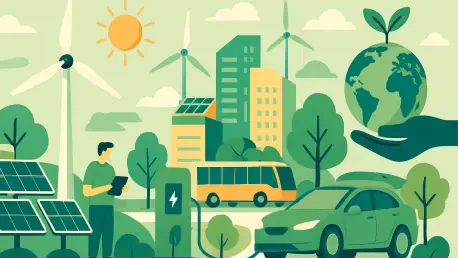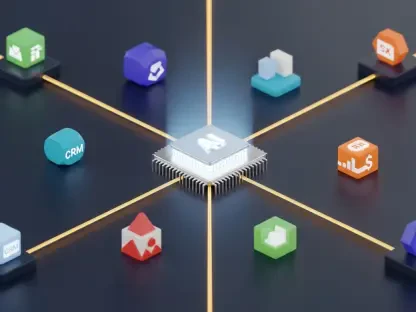In a world grappling with the staggering reality of a $3.3 billion daily loss in global GDP due to stalled progress on sustainable development, a transformative solution has emerged to challenge the status quo and redefine the path forward. The United Nations’ 2030 Agenda, with its 17 Sustainable Development Goals (SDGs), remains a beacon of hope, yet systemic failures and fragmented efforts have hindered meaningful advancement. Enter a groundbreaking technology poised to redefine how global challenges are addressed, offering a holistic approach to integrate efforts, unlock economic potential, and empower billions. This innovative platform promises to shift the paradigm from isolated interventions to a unified, interconnected system, sparking curiosity about whether technology can indeed bridge the gap between ambition and achievement in sustainable development.
Unveiling a New Era of Systemic Solutions
Redefining Development with a Civilizational Framework
The concept of a “Civilizational Operating System” (COS) marks a significant departure from traditional approaches to sustainable development, presenting a platform that integrates real-time geospatial data, quantum computational analytics, and human cognitive metrics under an ethical governance framework. This technology stands out by enabling dynamic recalibration of interventions based on their cross-goal impacts, a capability far beyond the reach of conventional narrow AI tools. By viewing the SDGs as interconnected nodes within a larger system rather than standalone targets, it addresses the persistent silo effect that has long plagued global efforts. The potential to harmonize actions across multiple goals offers a fresh perspective on tackling complex challenges, ensuring that progress in one area amplifies benefits in others, creating a ripple effect of sustainable impact.
This systemic integration is not merely theoretical but grounded in measurable outcomes, such as the projected 8.7X Social Return on Investment (SROI) derived from unified actions. Unlike fragmented strategies that often yield diminishing returns, this platform quantifies the exponential value of synergy through a System Integration Theorem. Such an approach challenges the inefficiencies of isolated mandates by providing a data-driven foundation for decision-making. Furthermore, the emphasis on ethical governance ensures that technological advancements do not outpace moral considerations, fostering trust among stakeholders. As global development continues to grapple with coordination challenges, this framework offers a blueprint for aligning diverse efforts toward a common purpose, potentially transforming the landscape of international collaboration.
Tackling Funding Gaps through Economic Innovation
One of the most pressing barriers to achieving the SDGs has been the chronic funding gap, a shortfall that hampers even the most well-intentioned initiatives. This platform proposes a radical shift by reframing sustainable development as a $12 trillion investment opportunity by 2036, turning what was once seen as an aid-dependent challenge into a self-sustaining economic engine. By optimizing resource allocation and creating economic assets from cognitive labor markets, it aims to bridge financial shortfalls with innovative market mechanisms. This approach not only addresses immediate funding needs but also lays the groundwork for long-term economic resilience, ensuring that sustainable development becomes a viable business case rather than a perpetual burden on global budgets.
Beyond immediate financial solutions, the focus on economic innovation extends to transforming marginalized populations into active contributors to global growth. The platform projects the creation of millions of jobs optimized by AI, providing a pathway for economic inclusion on an unprecedented scale. This dual focus on funding and job creation tackles systemic inequality by turning untapped human potential into a driving force for progress. By linking economic incentives with sustainability goals, it creates a self-reinforcing cycle where investment in development yields tangible returns, encouraging greater participation from private and public sectors alike. Such a model could redefine how resources are mobilized, making sustainable development an attractive prospect for investors seeking both profit and purpose.
Empowering Humanity for a Sustainable Future
Unlocking Cognitive Potential on a Global Scale
A staggering 4.5 billion people remain excluded from the digital economy, representing a vast untapped resource that this technology seeks to activate. Through neuro-symbiotic AI interfaces and global cognitive marketplaces, the platform aims to engage these individuals, reducing cognitive inequality by an estimated 73% while creating 28 million AI-optimized jobs. This ambitious initiative moves beyond traditional development aid by empowering people as active participants in a knowledge-driven economy. By harnessing human cognitive potential on a massive scale, it addresses a critical systemic failure, ensuring that sustainable progress is not limited to a privileged few but becomes a shared global endeavor.
The implications of unlocking such potential are profound, as marginalized communities gain access to tools and opportunities previously out of reach. This technology facilitates a shift from passive recipients of aid to empowered agents of change, fostering resilience and innovation at the grassroots level. Additionally, the integration of human metrics into broader development strategies ensures that interventions are tailored to real-world needs rather than imposed from above. Pilot implementations and preliminary validations, such as international surveys, have already demonstrated the platform’s capacity to deliver rapid, impactful results. As efforts to close the digital divide intensify, this approach offers a scalable model for inclusive growth, potentially reshaping societal structures worldwide.
Balancing Innovation with Ethical Responsibility
While the promise of planetary-scale optimization is enticing, the success of such a transformative platform hinges on maintaining a delicate balance between innovation and ethical responsibility. The establishment of a proposed 47-nation Neuro-Ethics Council underscores the commitment to principled execution, ensuring that technological advancements do not compromise human dignity or equity. This governance framework is designed to oversee the platform’s deployment, addressing potential risks and fostering collaborative evaluation among diverse stakeholders. By prioritizing transparency and accountability, it aims to build global consensus on the responsible use of cutting-edge tools in sustainable development.
Moreover, the call for limited-scale pilots and joint technical working groups reflects a pragmatic approach to implementation, allowing for real-world testing before full deployment. This cautious yet progressive strategy ensures that ethical considerations remain at the forefront, even as the platform scales to address global challenges. The focus on harmonizing economic growth with sustainability goals further reinforces the need for a balanced approach, preventing short-term gains from undermining long-term stability. As international collaboration becomes increasingly vital, this commitment to ethical innovation could serve as a model for future technological interventions, ensuring that progress benefits all of humanity without unintended consequences.
Reflecting on a Path Forward
Looking back, the introduction of this transformative platform marked a pivotal moment in the journey toward achieving the SDGs, as it tackled systemic failures with an integrated, investment-driven approach. Past efforts to navigate global challenges through fragmented strategies met with limited success, underscoring the necessity of a unified system. What stood out was the technology’s ability to empower billions while creating economic opportunities, a feat that redefined sustainable development as a shared responsibility. Moving forward, the focus should be on scaling pilot programs with rigorous oversight, ensuring that ethical frameworks keep pace with innovation. Collaborative efforts among nations and stakeholders must intensify to refine this technology, turning its potential into tangible outcomes for a more equitable and sustainable world.









